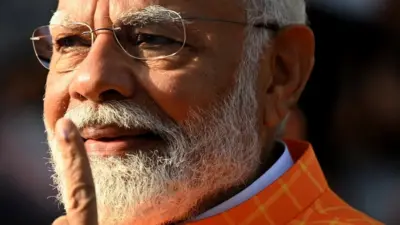We've updated our Privacy and Cookies Policy
We've made some important changes to our Privacy and Cookies Policy and we want you to know what this means for you and your data.
Why are wages so weak?
- By Simon Jack
- Business editor
Image source, Getty Images
In August 2013, the Bank of England Governor said he would consider raising interest rates when the unemployment rate came down to 7%.
At the time, it was 7.8% - today it is at a 42 year low of 4.3% and rather than raising rates, the only adjustment the bank has made is to cut rates further in the aftermath of the referendum result.
He thought, along with most economists, that as unemployment came down, wages would start to rise and that would be the sensible time to consider returning interest rates to normal levels rather than levels associated with economic intensive care.
What happened? And more importantly what should the Bank of England do now?
The Phillips Curve
Usually, as the unemployment rate falls, competition for available workers increases and, therefore, so do wages.
This relationship is called the Phillips Curve but it has become increasingly apparent that someone, or something, has taken a Phillips screwdriver to this mechanism. We have the lowest unemployment since 1975 and yet wage growth is weak.
There are several competing theories as to what has happened to alter this relationship. The most hotly debated of these explanations is that we have an inexhaustible supply of cheap labour from the EU which is holding down wages.
Image source, Getty Images
A Bank of England research paper found that in low skilled occupations, every 10% increase in the ratio of migrant to native worker created a 1.88% fall in wages.
There was no evidence it affected higher skilled jobs at all and so the impact on overall UK wages would be, in the words of the author Stephen Nickell, "infinitesimally small".
It's also worth noting that stagnant wage growth is a global phenomenon to be found in the US and also Japan where net migration is negligible.
Increasing labour costs
The business lobby points out that an array of additional burdens on them such as the introduction of the apprenticeship levy (affecting big businesses), the introduction of the living wage, and the roll out of auto-enrolment (affects smaller businesses more) means they simply can't afford to offer higher wages.
It makes intuitive sense that an increase in overall labour costs would make it harder to raise basic pay.
Pay growth did indeed fall around the time of auto-enrolments introduction in 2013 but in the years since, wage growth has fluctuated from 1% to 3% so there doesn't appear to be any lasting impact.
Image source, Getty Images
Also, it would presumably act as an equally powerful disincentive to hiring people in the first place which it clearly hasn't.
The changing nature of work is also a suspect in this mystery.
The economist Martin Beck has made powerful arguments that companies which offer less secure forms of employment, like Uber, can switch their demand for labour on and off based on its cost - meaning pay rates no longer move upward as unemployment moves downward.
Decline of unions
This has the important knock-on effect, argues Beck, that workers become so cheap that companies are tempted to use them rather than invest in more productive machines and processes so worker productivity (and the ability to pay them more per hour) declines.
One of the least discussed explanations is the decline in power of labour organisations. Unions experienced their biggest fall in membership since records began last year losing 275,000 members.
Image source, Getty Images
Union membership has halved since the late 1970s and both the rise in self employment and the fall in public sector roles could make it hard to reverse that decline.
There are probably elements of all of these factors at work. What really matters it not so much whether your pay is going up 1% or 3% but more, what your wages are doing compared to inflation.
Right now more of us are working than ever before and yet on average we are getting a bit poorer every day as inflation devours any income growth.
The question is when will it change - and why?
Solid bet?
The Bank of England expects wage growth to exceed inflation next year for two reasons.
The first one is a pretty solid bet. Inflation will fall as the effect of sterling's post-referendum drop works its way through the system. Comparing prices of imports now to the same time last year will stop showing such a big rise.
The second reason is that it's convinced we must now be near the threshold when low unemployment begins to push wages higher.
It's been wrong on this before of course, but there is increasing evidence from recruitment firms that scarcity of available workers is beginning to force employers to offer higher salaries in some sectors.
Presiding over an economy in which working people are getting poorer every day is not a very comfortable political position to be in. We have seen the cap on public sector workers' pay loosened this week, under pressure from a TUC threatening strike action and a rejuvenated Jeremy Corbyn.
The government will be dearly hoping the Bank is right this time.
We will get an inkling of how confident the Bank is in this prediction when it votes on interest rates tomorrow.
Last time only two out of the nine rate setters thought the time was right to nudge rates higher. Previously one other, Chief Economist Andy Haldane, has said he might join them later this year.
It will be worth keeping an eye out for how he votes.
Top Stories
Features & Analysis
Most read
Content is not available








